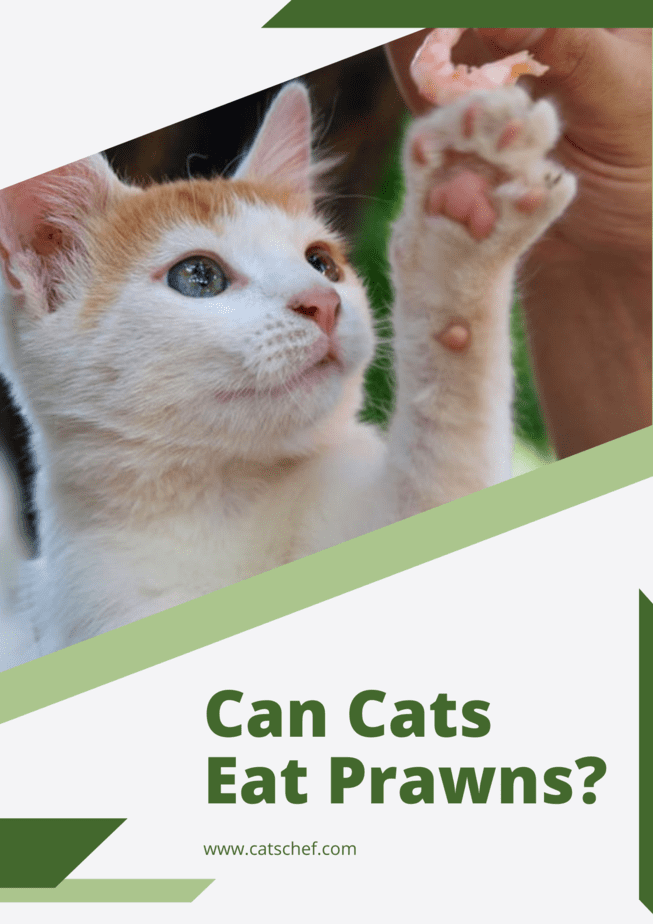You may have seen videos of cats fishing which are both hilarious and fascinating. It’s not just that cats are amazing hunters, but now they’ve pushed it further with the fishing! But, what about their catch? Can cats eat prawns if they manage to catch one?
Even though these fishers would most probably catch some smaller fish rather than prawns, everything’s possible. We know felines are well-known fish-lovers, but what about other seafood?
Seafood isn’t something you would think of as natural for a cat’s diet. In order to catch fish, they have to fight off one of their worst enemies – water. So, how would a scaredy-cat possibly get her paws onto some seafood?
Maybe the first person to blame is you… Yes, we all tend to feed our pets with human foods, so what? What’s the worst thing that could happen if cats eat some prawns?
Can cats eat prawns? Is it okay for them?
If you still can’t refrain from feeding your furry friend human foods, we won’t judge. We’ve all been there and done that, but doing the research is the first and most important step when introducing new foods into your cat’s diet.
You probably hoped for a positive answer when you typed can cats eat prawns. Well, we’re more than happy to tell you that you were right! Yes, cats can eat prawns in small amounts, but don’t get your hopes up too high.
Every good comes with the bad and vice versa, so please continue reading and find out where your cat’s limitations are when it comes to feasting on prawns.
Can my pet benefit from eating prawns?
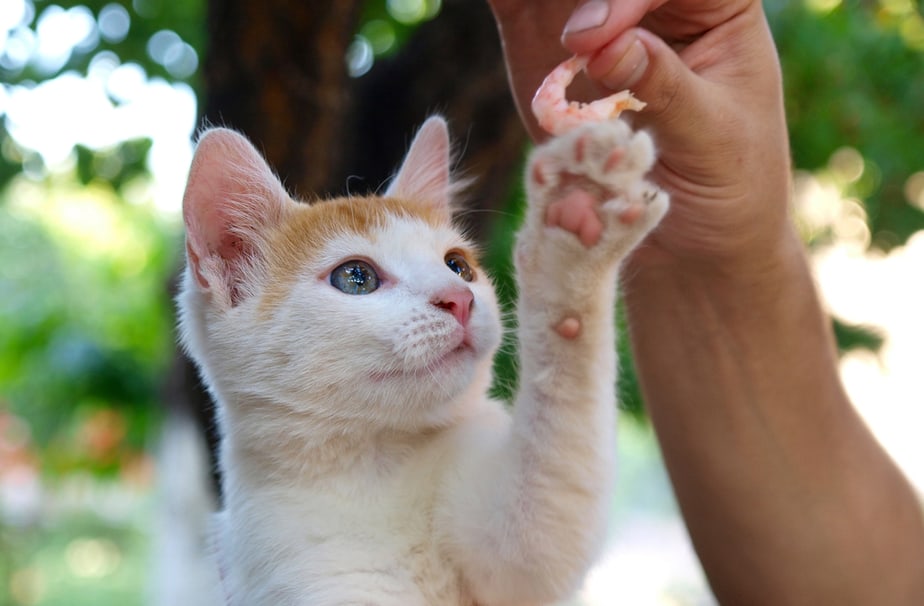
We, as the primary carers, must meet the expectations and needs of our felines. Cats are obligate carnivores who require meat to survive. Protein is their primary dietary requirement. Prawn meat is high in protein and can act as a great source of energy for cats.
Cats are drawn to foods that provide them with a lot of nourishment. Prawns do, after all, have some nutritional value so the answer is that cats can eat prawns, and they usually enjoy it.
A chock-full of protein
Prawns are an excellent protein source for cats. This component plays an important role in your cats’ health in a variety of ways. It gives them energy as well as necessary amino acids. Animal protein is easier for cats to digest than protein derived from plants.
Omega-3 fatty acids are abundant in prawns, too. These fats can be found in a variety of marine foods, including lobster. They can benefit your cat’s skin, coat, and joints. Omega-3 fatty acids strengthen the hair follicles, which leads to better fur and reduced shedding.
These fats are also anti-inflammatory, which helps to reduce joint inflammation. This is particularly beneficial for senior cats. It makes it easier for them to move around and reduces joint pain. Omega-3 makes jumping and other actions simpler for younger cats.
Polyunsaturated lipids, such as omega-3 fatty acids, have numerous health benefits for cats. They can aid in the maintenance of healthy cholesterol levels. As a result, the risk of stroke and heart disease is reduced.
Other nutrients found in prawns
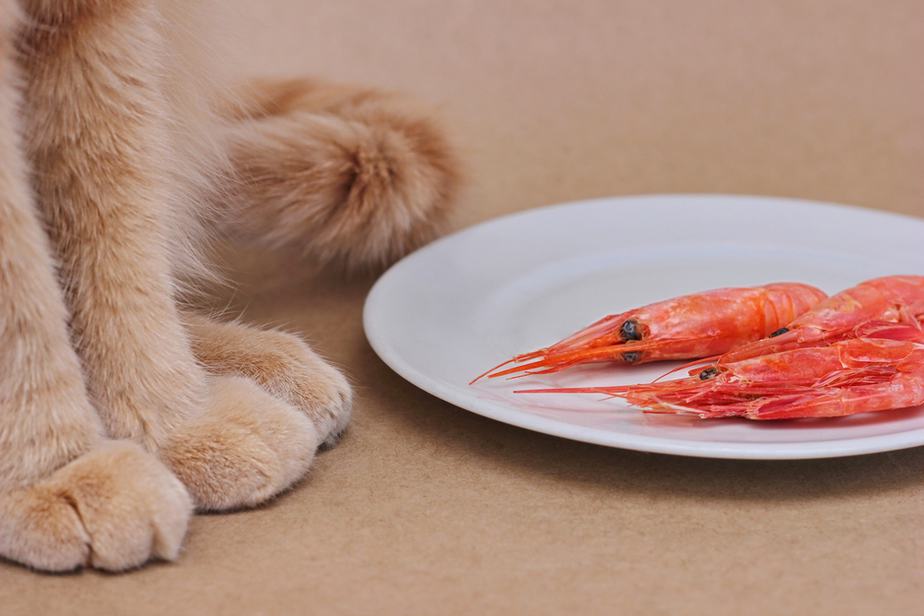
This seafood also contains certain important vitamins. Vitamin B, vitamin C, vitamin B6, and vitamin B12, to name a few. Cats don’t create enough of these on their own, thus they must be supplemented on a regular basis.
Vitamin B is one of those vitamins that must be controlled in order to be effective. This supplement promotes cell proliferation and helps to prevent anemia. Lethargy and weight loss are both symptoms of vitamin B insufficiency.
Vitamin C, like vitamin B, plays a crucial part in the life of a cat. It aids in the regulation of metabolic functions in their bodies as well as the maintenance of tissue growth. It’s also a good immune system enhancer.
Prawns also contain copper, zinc, selenium, phosphorus, and magnesium, making them mineral-dense seafood. These vitamins aid in the protection of your cat’s immune system as well as her overall health.
Zinc and copper are both antioxidants that aid in the reduction of inflammation. Zinc can also help speed up the healing of wounds.
Copper helps in different bodily functions in cats, including the formation of bones and connective tissues. It also aids iron in the formation of red blood cells, so copper deficiency is linked to anemia in cats.
Selenium is also necessary for the proper function of a cat’s immune system. It’s good for your cat’s overall health and can help protect her from diseases like cancer.
The drawbacks of prawns
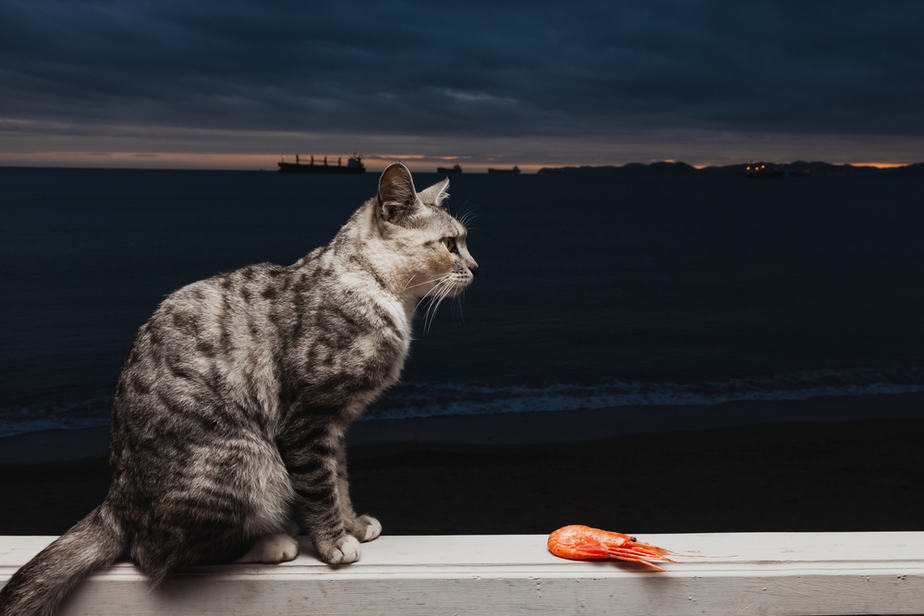
Can cats eat prawns without any consequences? These can be dangerous for a variety of reasons. Your cat, like humans, may suffer from allergies; and seafood allergy is one of the most frequent ones.
Vomiting, diarrhea, and abdominal pain are some of the more typical symptoms. Check if your pet has difficulties breathing after consuming prawns. Lethargy, itching, and skin rashes are further symptoms of a seafood allergy.
Because cats are prone to seafood allergies, add prawns to their diet in limited quantities. If your cat doesn’t show any of the above-mentioned symptoms, you’re good to go. If she has an allergic reaction, contact your veterinarian for further instruction and treatment.
This is why we recommend starting with little portions. These will tell you if your cat has any allergies and what kinds of fish she likes and dislikes. If she refuses, don’t try to persuade her otherwise; instead, stop providing her seafood and replace it with another cat-appropriate treat.
Calorie-dense food
Calories are an important nutrient for humans and cats alike. However, in order to maintain excellent health, calorie intake should be controlled. We understand that resisting some foods might be difficult at times, but it’s for your and your kitto’s own benefit!
Because they’re high in calories, prawns aren’t something you should eat frequently or in significant quantities. Because of the meat part, this might be a challenging process.
The protein and fats found in prawns may be appealing to your four-legged buddy. While cats can eat prawns on occasion, they shouldn’t have access to it all of the time.
Furthermore, a high-calorie diet raises the risk of acquiring type 2 diabetes. Felines, like humans, can get melancholy as a result of being overweight. This may have an impact on their everyday lives and overall quality of life.
Can cats eat cooked prawns?
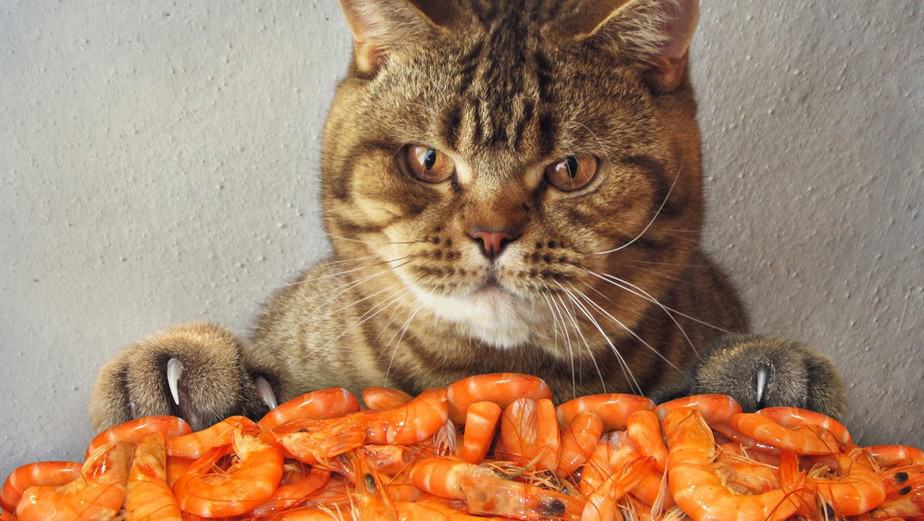
The best way to prepare this treat is to cook it. High temperatures eliminate any parasites or viruses that may be present in raw meat. You can ensure your cat’s safety while preparing the treat this way.
Cooked meat is also a lot easier for your cat to consume! Raw meat is harder for cats to chew, but properly prepared prawns can be easier to chew and will digest better.
When it comes to cats, even cooked prawn flesh has its limits. Keep an eye out for spices and other ingredients. These have been known to harm your cat and can produce minor symptoms such as diarrhea and vomiting.
You’re putting your furchild at risk by adding table condiments like salt. Sodium poisoning can occur in cats if they consume too much salt. If your pet consumes seafood that has been seasoned and spiced, she may develop a variety of symptoms.
Can cats eat raw prawns?
Taurine, an amino acid that is crucial in the metabolism of cats, is abundant in raw prawns. They’re also high in protein and contain beneficial enzymes.
However, uncooked seafood is dangerous! Just like raw squid, raw prawns pose a certain threat to your pet’s health.
We can easily get rid of bacteria and parasites by cooking the prawns in boiling water. Raw prawns have germs that can cause a variety of dangerous illnesses.
If the seafood they consume is tainted with bacteria, the most frequent of which are listeria, vibrio, clostridium, and salmonella, cats can acquire food poisoning. These bacteria can cause nausea, upset stomach, diarrhea, and vomiting, to name a few symptoms.
Raw foods can also harbor parasites such as tapeworms, roundworms, and liver flukes. If your cat consumes raw prawns, one or more of these parasites may build a home in her body. A parasite infection can have a variety of negative consequences, ranging from slight to severe.
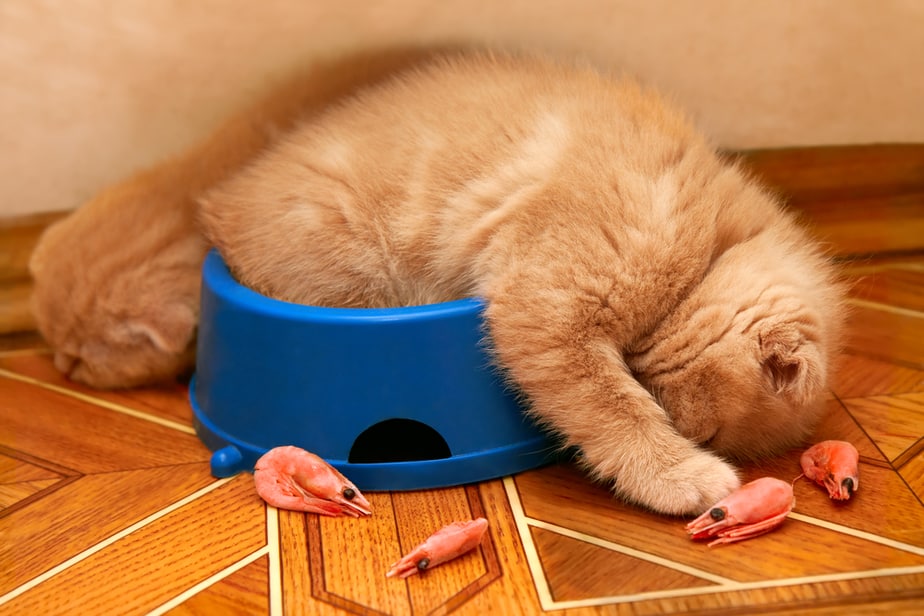
What about the canned ones?
Canned prawns are safe for cats to eat. There are, however, some hazards associated with giving this to your cat.
You may believe that canned prawns are less expensive than fresh ones, and you are correct. But the reason why they’re cheaper is that they’re not as healthful as fresh ones.
All of the flavorings and preservatives used to guarantee a long shelf life are a reason for concern. All of these extra elements, however, are not what felines require.
Sodium-rich meals should be avoided by your cat. Salt can be toxic to cats if consumed in big quantities. Sodium poisoning can cause vomiting, diarrhea, and even seizures and coma in some people.
Are prawn shells okay for cats?
This is an unequivocal no.
Prawn shells are rough and spiky, and they might irritate the stomach. They should be eliminated for safety reasons, even if they aren’t poisonous to cats. Don’t be alarmed if your cat eats a piece of prawn’s shell, though.
Felines are curious creatures, and we all know what killed one. These shells constitute a choking hazard, despite the fact that they are non-toxic. Any larger piece will most likely get stuck in her throat or intestines.
Cats have sharp teeth, but the shells are too hard for them to gnaw through. They are sharp and can easily harm your cat, in addition to them being a choking hazard. These sharp bits have the potential to injure her lips, mouth, and perhaps her throat.
What about frozen prawns?
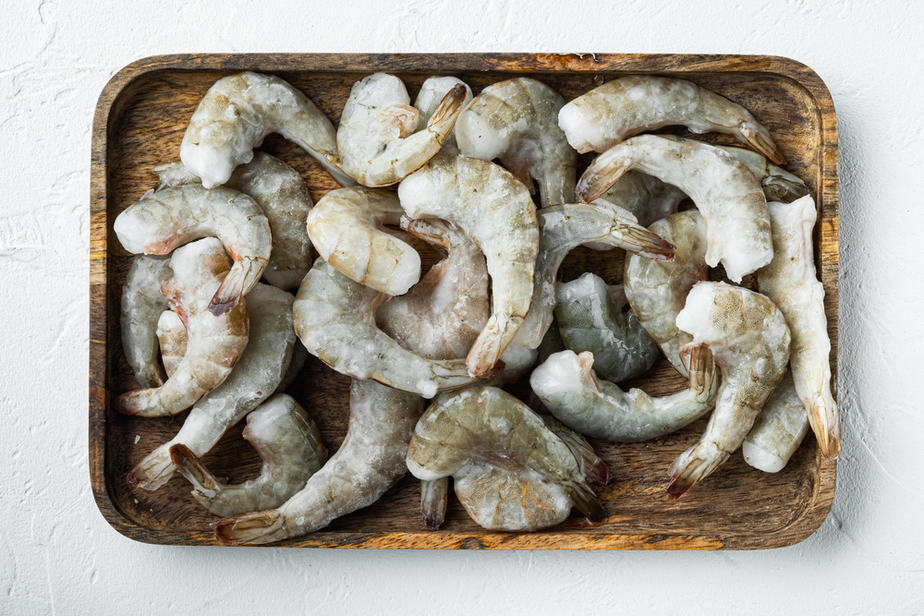
Yes, cats can eat frozen prawns, in a nutshell. Low temperatures, as well as high temperatures, can eliminate bacteria and pathogens in raw foods.
Cooking the prawns kills any germs and aids in the release of vitamins and minerals. Because bacteria and germs can’t survive at cold temperatures, freezing seafood has a similar effect.
However, don’t give your pet frozen prawns straight from the bag. This may seem like a fantastic summer treat to keep your cat hydrated, but inspect them before feeding them to your cat.
Also, don’t make this a habit because too much of this seafood could hurt your feline. Besides, we’re not sure if she’ll go crazy about frozen prawns as they have a less noticeable and less attractive smell.
Can cats eat shrimp?
Felines love the fishy aroma and smell of shrimp. That’s why they give you that pleading look every time you’re feasting on this seafood delicacy.
If you want to share it with your pet, you should definitely opt for a fresh, wild-caught shrimp. Cook it without any additional seasonings, oils or sauces and serve it to your furchild. I’m sure she’s going to love it.
Although cats can eat raw shrimp, it’s not suggested since shrimps can contain antibiotics, fungicides, or other potentially hazardous substances that the cooking procedure helps to remove.
In conclusion
Out of all the seafood out there, can cats eat prawns? We’re delighted to inform you that these treats are completely safe for your pet to consume! They’re high in vitamins and minerals, which are beneficial to your cat’s health.
The good news is that they include some protein and make for a tasty treat on occasion. Prawns are safe for cats to eat, but they should be consumed in moderation because they are loaded with calories, which can be harmful if consumed in excess.
Given that prawns are not a staple food, one or two portions weekly will suffice. To keep things simple, prawns should make up no more than 10% of your cat’s diet.
Cooked prawns are best served without any spices and seasonings as they’re harmful to felines. Your furchild is okay to have some raw prawns, but don’t overdo it. There’s always a risk of food poisoning and food allergy when it comes to prawns.
Crustacean shells can cause cuts in the mouth and throat, as well as be a choking hazard for your cat. As a result, before giving prawns to your cat, make sure you remove all pieces of the shell.
